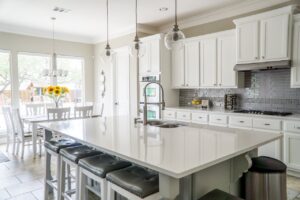
Interior design is important for several reasons, and its significance extends beyond mere aesthetics. Here are some key reasons why interior design is needed:
- Functionality: Interior design is crucial for ensuring that a space is functional and serves its intended purpose. Designers consider the layout, flow, and arrangement of furniture to optimize the use of space and enhance its efficiency.
- Aesthetics: While functionality is essential, aesthetics play a significant role as well. Interior design helps create visually appealing and harmonious spaces by considering elements such as color, texture, patterns, and lighting. A well-designed space can evoke positive emotions and enhance the overall experience of the occupants.
- Personalization: Interior design allows individuals to personalize their living or working spaces, making them reflective of their personality, preferences, and lifestyle. This personal touch can contribute to a sense of comfort, belonging, and well-being.
- Optimizing Space: Interior designers are skilled at making the most of available space. They can transform small or awkwardly shaped areas into functional and visually appealing spaces through creative design solutions, such as built-in storage and multi-functional furniture.
- Efficient Use of Resources: Interior designers are knowledgeable about materials, finishes, and furnishings. They can help clients make informed decisions that take into account not only aesthetics but also durability, sustainability, and cost-effectiveness, leading to the efficient use of resources.
- Health and Well-being: Design choices can impact the health and well-being of occupants. Interior designers consider factors such as lighting, ventilation, ergonomics, and acoustics to create spaces that promote physical and mental well-being.
- Branding and Identity: In commercial spaces, interior design plays a crucial role in establishing and reinforcing a brand’s identity. The design elements chosen can communicate the values, culture, and message of a business, helping to create a unique and memorable identity.
- Increased Property Value: Well-designed interiors can contribute to the increased value of a property. Homes or commercial spaces with appealing and functional designs are often more attractive to potential buyers or tenants.
- Regulatory Compliance: Interior designers are knowledgeable about building codes, regulations, and safety standards. Ensuring compliance with these guidelines is essential for the safety of occupants and the legal standing of a property.
- Adaptability and Future-Proofing: Designers consider the potential future needs of occupants and design spaces that can adapt to changing requirements. This future-proofing ensures that the design remains relevant and functional over time.
In summary, interior design is needed to create spaces that are not only visually pleasing but also functional, efficient, and supportive of the well-being of the people who inhabit them. It encompasses a broad range of considerations that contribute to the overall quality of living and working environments.
